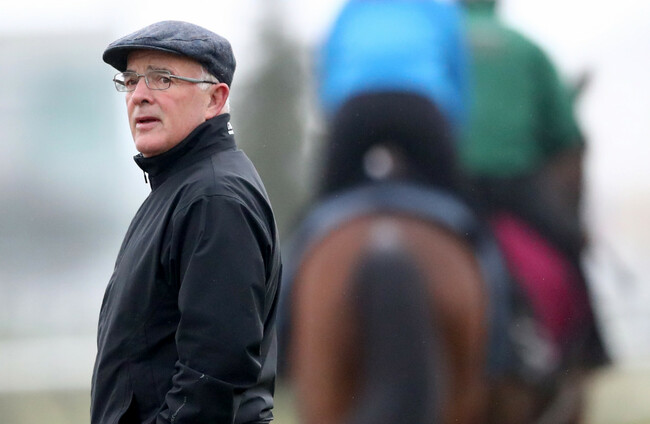“I’VE LOADS OF blind spots,” says Ted Walsh from the comfort of his living room. “I get angry very easy. I say too much most times. Mouthy. My father was quiet as a mouse. Mother too. I would always be strong enough to voice my opinion.”
Patrick Mullins interrupts as if sensing the need to provide Walsh a measure of reassurance.
“I think that’s what makes Ted good on TV because I respect his opinion and he’s not afraid to say what he thinks,” the younger man offers. “A lot of time on TV and in writing, people say a lot without saying anything. You need someone who is not afraid to give their opinion and he has the experience to back it up.”
At first glance they might not seem like men given to much introspection. Theirs is a macho world in which brave men and women take hard falls and expect to return to the saddle sooner than nature would allow. But these are far from ordinary horsemen.
Among the general public, Walsh is probably best known for his television punditry. In the racing community his status has long been assured. As the pre-eminent amateur jockey of his era Walsh set the bar. That he went on to train a Grand National winner only cemented his standing in the game.
“Trainers don’t retire, they just die,” Walsh told Eamon Dunphy in an interview for his podcast, The Stand. Taken at face value those words fog the picture of his profession, suggesting something akin to addiction when really it is an astute and profound description of what it means to lead a vocational life. Regular hours and work time directives do not apply. It is only when trainers have no more living left that they finally stop. A life lived within racing cannot be lived without it.
Walsh has 68 years on the board and if not in the winter of his career is at least feeling the early evening chill. At 29, Patrick Mullins continues to blossom. Son of Willie, the greatest trainer of his, and perhaps every, generation, he has steadily grown in stature, no longer heir apparent and firmly established in his own right as one of the game’s leading lights. Regardless of what has been inherited, his cultivating a record number of winners as an amateur in the saddle puts him in elite company, seizing a mantle previously occupied by Walsh, the man now sitting beside him on the couch.
“It was a bonus for me to be as successful as I was,” says Walsh reflecting on an amateur career that was the best of his time, and all time, until Mullins arrived on the scene. “He [Patrick] had a lot more pressure. Like Willie was champion amateur and a successful trainer. No one expected Patrick to be as good as he is but at the same time if he was a fail, it would have been a bigger thing. It would be said: ‘He’s not a bit like his father.’ Instead he’s a superior rider to his dad, in every way. Willie was as good as it gets at that time but he’s [Patrick] brought it to another level. Patrick is as disciplined and as professional as you could get as an amateur.”
Such praise does not come lightly. Outspoken and often disliked for it but astute and quick-witted and so much loved for that, Walsh owns a bespoke collection of verdicts, assessments and views, and delivers them on time, every time. Walsh is clearcut and as fluent now with words as he was with Hilly Way over fences. That win in the Champion Chase of 1979 remains the most notable victory of his race-riding career but the man sitting beside him has scrubbed most of his records from the board. Mullins eclipsed Walsh in July, 2018 when notching the 546th winner of a career that may not yet have reached its peak.
“When I see so many of my friends struggling to get the dream that I’ve been lucky enough to get, it’s very easy to see the luck and opportunity,” says Mullins dismissing the notion of him as an uncommonly self-aware young man. “It’s not a weight on my shoulders but I want to win! I want to win as much as I can. To me anyone who competes wants to do that.”
Names of those less fortunate than him quickly come to mind. He shares a house with fellow riders Richie Deegan, Brian Hayes and Rachael Blackmore.
“Look at Rachael Blackmore,” he says insistently. “She didn’t suddenly become a good jockey overnight, She’s been working at it for so long. I was in a different position in that I got the opportunity much quicker.”
His own narrative is not quite as straightforward as it might seem. He has the racing bloodlines but did not spend every morning of his youth working with black type.
Secondary school took him away from home, to Clongowes Wood College and the company of bluebloods, sons of leaders from the business and political world. Rugby players dominate the list of sporting alumni – Gordon D’Arcy and Rob Kearney most notable – but Mullins is just as worthy. And like his rugby brethren, he has gone to great lengths to achieve success.
“I was in seven-day boarding school [Clongowes] until I was 18 and then I was in college [Maynooth University] five days a week so I was a proper amateur for a long time,” he says. “When I was 16, 17 and 18 I was only getting to ride out one weekend a month. I used to sneak over to Charlie O’Neill’s, four fields left of school, on a Wednesday and a Saturday. Alexander Banquet was in livery over there. Willie always told me I’d probably only get two or three years at this because I was tall. I never really thought that I would be at it for very long.”
Mullins has travelled far and wide to foster his racing education. For whatever reason, in this corner of the equine world competing stables welcome visiting rivals without compunction.
“Willie and Jackie [his mother] would always have encouraged me to go to other yards,” says Patrick. “I like to see other places as well from a training point of view for the future, to see different ways of doing it. We’re so busy at home it’s hard to go away for a long period of time. And we’re going through such a golden patch now it would be a pity to go away. I like to go away to some of the flat yards in England like Gosden’s and Hammond’s. I’ve gone to Joseph’s [O’Brien] here, John Kiely and Gordon’s [Elliot]. It’s a great sport like that. There are very few sports I’d say that could you do that.”
In soccer for instance, managers have been upbraided for espionage. In January, Leeds United manager Marcelo Biesla provoked a furious response from Derby County when the Rams uncovered a spy at their training ground.
“They like one another,” says Walsh explaining the culture of their game. “If Gordon’s back was against the wall tomorrow morning over something, there’s any one of five or six trainers he could ring and say: ‘Listen, I’ve a problem here. What do you think?’ Willie would be the same way.”
Says Patrick: “You cannot be secretive because staff come and go.”
“Fellas know what’s happening in a yard,” Walsh confirms. “If you’re doing something wrong in a yard, you cannot do it on your own.”
Warming to the theme, the pair fall into lively conversation.
Mullins: “You can have an advantage for a while and then everyone catches up. [Martin] Pipe changed the way he trained in England and now everyone does it. He went to interval training, short and sharp. They all used to gallop real long.”
Walsh: “They say Christy Ring did it in hurling. Instead of running around the pitch, they sprinted across it because that’s all you’ll ever be doing he [Ring] reckoned, sprinting to get the ball and hit it. You could jog off from here [Kill] to Johnstown or Naas but if you went flat out you wouldn’t get 100 yards.”
Mullins: “I remember training with a hurling team in college and when we were doing the laps I was grand at the top but when we were doing the sprints, I was in the middle of the pack.”
Walsh: “Paddy Mullins was a very successful trainer but Paddy Mullins had something about him that he could spot a real good horse. There were very few horses that Paddy Mullins had that were good that he didn’t get the best out of. I’d say the same thing applies to Willie. I’ll see Willie there, he’ll arrive at the Curragh with a bunch of horses to work and the plan would be that all horses are going to work but for some reason when one horse gets off the box, he might say: ‘That fella could go for a walk today.’ Don’t ask me what he’d see. That’s something you either have or you haven’t. He’s got that innate ability to spot things that other lads can’t spot.”
Mullins: “It’s experience too.”
Walsh: “Quevega now. He [Willie] minded her and produced her in six Cheltenhams to win. Sometimes gave her one run, sometimes gave her no run. Nothing textbook.”
Mullins: “Willie trains by eye. You see a lot of places, especially on the flat, there’s just a routine because they’re more prisoners of time. They have to run at two and three [years old]. Willie sees every horse every morning. He might say we’ll do less with him today. There is a routine and routine is very important but he’s not afraid to change it on what he sees. ‘He looks a bit light,’ or, ‘a bit cold in his coat,’ he [Willie] might say when you ask him. It doesn’t always add up. Sometimes he’ll say something and you’ll go: That’s one plus one and the answer is two. The next thing you’ll think you see the same thing and you think one plus one is two but it’ll end up being two plus one equals three. It’s a slightly different equation because maybe he’ll say: ‘That horse is always light,’ or, ‘That horse is heavy boned,’ or, ‘That’s how he looks,’ or, ‘We need to work him harder.’ And he’s not always right, same as everyone. But he’s right more often than not.”
Walsh: “If you’re afraid of getting beat you’ll never win because you’ll be cautious all the time. You have to be brave.”
Their discussion approaches the final straight but only because Patrick has an appointment elsewhere. They have been running a good gallop from the start like those great horses they have ridden to victory at Cheltenham. If Ted is always keen, Patrick prefers to settle, ordering his thoughts before making them a matter of public record. As soon as Ted delivers his latest piece of ornate commentary, Patrick fills a gap a lesser mind would not have spotted.
Mullins: “Willie would say that Ted might do something and six horses away from him, a gap would close and the other lads would be busy blaming themselves but Ted would have done it and no one would know. Willie would always be explaining this to me on how to race ride and how to ride tight, which I think is a very important part, particularly in bumpers, to be able to ride tight. It’s as much your job to make it hard for the other fellas. If you’re coming up the outside, you’re trying to keep everyone tight on the inside. The fella on the inside might be going the shortest way around, which is fine, but he’s going to have trouble in running. You’re trying to get a clear run and you’re trying to keep everyone else tight. When I started off Nina [Carberry] was a master at it.”
Walsh: “She’s [Carberry] basically trying to take him [Patrick] out of contention. She knows when she’s passing that he’s a danger and the lads coming down the inside are not aware of anything. They’re riding along nonchalantly because that’s what most of them do but she can mosey up, she tightens up so that the lads inside her, unawares, close the gap that Patrick was aiming at. That’s race riding. When you go by somebody in a race they should know you went by them. No point in giving everybody a chance. It’s no different than rugby or any other sport.”
Mullins: “One of the first things I learned from my father was to know everybody’s name because if you do need a bit of room and you just shout at a fella, chances are he won’t move. Whereas if I shout, ‘Ted, bit of room,’ you’re more likely to get it. Also then you have to remember you might call in a favour because you might have given a fella a bit of room at a previous meeting. It might be six months later. ‘Remember now Listowel there.’
Walsh: “The same way you’ll remember the fella who fucken didn’t give you the room!”
Mullins: “You always need to know who’s in front of you, who’s beside you, where the fancied ones are, if the lad in front of you might be a lad who’s going to get tired. Is the horse going to get tired? You need to be thinking always 100, 200 yards ahead and what’s going to change.”
Walsh: “It’s more about a racing brain than it is about anything else. Whether a fella is stylish or neat, that’s nice but it really doesn’t have any bearing on the result. The result is how you ride in the race. He [Patrick] is a great judge of pace too.”
Mullins: “I’ve been very lucky in that I’ve had coaches. My mother [Jackie] was champion lady amateur and she was second to Aidan O’Brien in that amateur championship. Willie obviously rode and Ruby [Walsh, Ted’s son] I’d be able to talk to so I’ve had coaches who have taught me this. They would come to me after a race and say: ‘You did this wrong.’ And I could ask them a question: ‘Should I have done that?’ It’s not coaching in a formal sense but I’ve been surrounded by people who know what they’re talking about.
Walsh: “I didn’t learn as fast as you. I was very moderate for a long time. I learned through watching other fellas. You could give Ruby as big a bollocking as you ever gave a fella and he wouldn’t get upset. You’d say to him, ‘You gave that a stones of a ride.’ He’d never back answer or question it. he’d take it on board. Right up to the present day, I could ring Ruby and say: ‘You weren’t great there. Well?’ He might have a very good reason but you could still say it to him. I’m sure Willie would say the same to him [Patrick]. Even though he’s ridden five hundred winners I’m sure there’s days when he says: ‘You didn’t fucken shine on him.’”
Mullins: “Plenty of them.”
Walsh: “He’s [Patrick] got to take it on board. You could coach a fella all day but if a fella hasn’t got it in him…”
Mullins: “When you respect the person you’re getting it from, it’s easy take it on board. I’m always amazed looking at other sports. You see Federer or Nadal and they’re on about changing coach or golfers working on their swing. You’re never too big to learn and take advice.”
Walsh: “I think nowadays, if a fella is clever enough, there are a lot of videos that you can look at. When I look back on myself, I think it’s a pity we didn’t have more videos.”
Mullins: “Video is huge.”
Walsh: “If you stand in front of the mirror with a pink tie on you and a black shirt and you think you look well – you can’t coach him. If he thinks, ‘I look smart here.’ When he really looks like a clown. The same way with a fella who looks at a video and says to himself, ‘I gave that a good auld ride now.’ A fella should know. My father [Ruby] would go silent and I knew I was after making a bollocks of it then.”
Mullins: “Willie is generally the same.”
Walsh: “We’d leave Listowel and get into the car, I’d be driving. And when we get to Limerick, I’d say to my father, ‘Would you like a cup of tea?’ ‘No.’ Now you’re gone from Listowel to Limerick and this is the first few words we’ve had. Then we’d pull into the petrol station and I might say, ‘Would you like an ice-cream?’ ‘No.’ We’d drive all the way home, a long drive through all them towns, and eventually he might say to me: ‘Did you think that race was on today?’ If I had left one late or went a mile too soon. ‘Did someone move the winning post?’ I’d say, ‘No.’ And he’d come back: ‘You were in front plenty soon enough anyway.’
Mullins: “Willie is quiet. He wouldn’t say a lot but if he does, five minutes later it’s done, it’s gone. I remember I rode one in Galway and I got caught wide in the GPT and then I came too late in the bumper. I was driving his car home. It was silent and then down a dark road I hit a pothole bang on, like nailed the pothole. ‘Pull in! Pull in!’ I pulled in, in the pitch dark on this little, windy road. ‘You’re after losing the bumper and the GPT today, you’re not going to break my car. OUT! I’ll drive.’ I quickly learned to get my own car and drive racing myself.”
Before the conversation concludes, they pause for reflection.
“I’ve always been very competitive,” says Mullins. “First you want to ride your first winner then you want to ride out your claim. Then you’re thinking you’d like a Cheltenham winner, a grade one winner. And when I got to 21 it looked like I was going to be able to keep my weight and do it long term. You’re always aiming for the next thing. I obviously have huge opportunity being where I am and I want to make the most of that so that when I retire I can say I made the very most of it. That’s driving me.”
Walsh offers a typically frank assessment: “He’s not going to have regrets. He knows he has to deliver too. And he’s delivering. He’s in a good position but he knows that he has a big responsibility if Willie sticks him up on Douvan or Un de Sceaux. Patrick is aware of everything that’s going on right from the bottom of his toes up. He’s not floating through life anyway.”
And for all that both men have seen of life, they cannot imagine a better way.
“A lot of my friends from school they’re working in London or Paris or Berlin,” says Mullins. “I’d love the opportunity in a parallel life to see something different, live in a different city for six months. But I wouldn’t swap what I’m doing. I’m hugely lucky to do what I do. Sure we’re not working at all.”
“No,” says Walsh.
This, the shortest of his answers; by far, the most telling.
- Originally published at 09.23
Subscribe to our new podcast, The42 Rugby Weekly, here:















Has Diego Simeone given an indication that he will play? I’d have thought it was pretty unlikely he’ll play since their medical team said he will need a few weeks to get up to match fitness. I hope I’m wrong though and he plays and scores of course.
Simeone told Spanish media yesterday that he’d start, Barry – I’ve added in a clip from the press conference to the article.
Ah brilliant, thanks a mill.
Barry do some study for f*ck’s sake
I watched a YouTube video the other day of all Torres Liverpool goals. I just don’t understand how he could go from the player he was, to the player he is now. It makes no sense to me. He was truly one of the world’s best when he was at Liverpool.
And also, I’d love to see him regain some form with atletico.
As a united fan even I can stand back and say he was awesome, the day he destroyed Vidic was incredible. But he went from that prolific player to someone who could not score from 2 yards out.